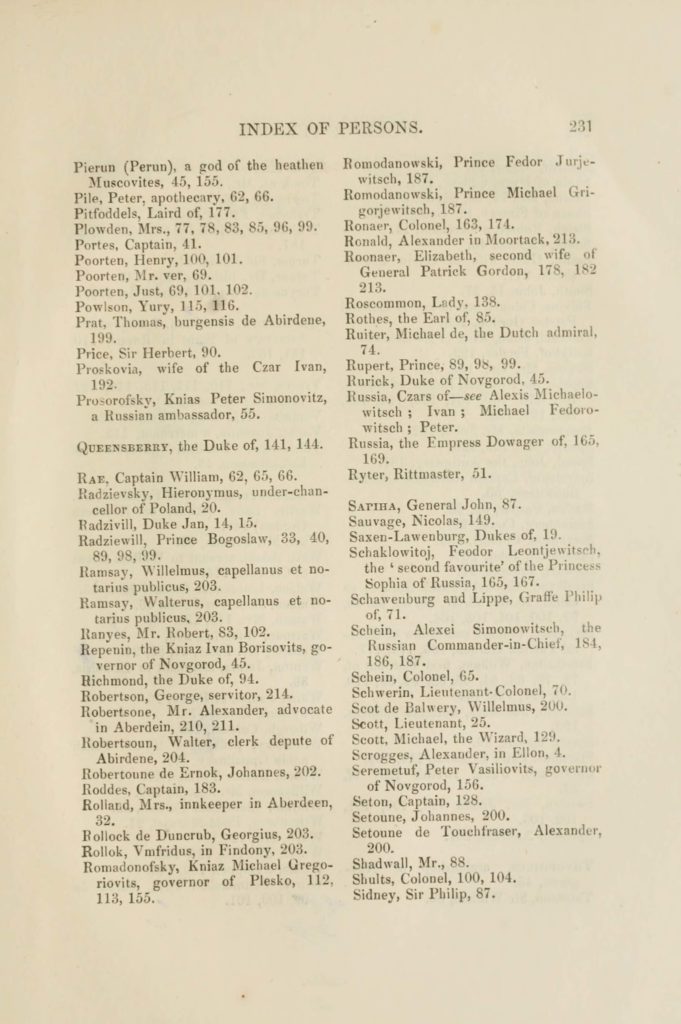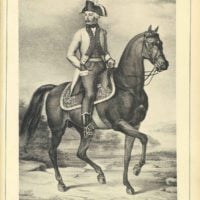
Related

INDEX OF PERSONS. 227 Grant, of Freuchie, Sir James

228 INDEX OF PERSONS. Ivan, Czar of Muscovy

222 INDEX OF PERSONS. Bockhoven, Colonel von

INDEX OF PERSONS. 227 Grant, of Freuchie, Sir James

208 APPENDIX. the pendicle called Murris Tack, and the milne of Auchleuchries

INDEX OF PLACES. 241 Poniedielna, the river

APPENDIX. 209 Sasine of Ardendraugbt and superiority of Auchleuchries

232 INDEX OF PERSONS. Sinclair, Major

654. OBER-OFFICER of the Dnieper Pikemen Regiment, 1776-1784.
INDEX OF PERSONS. 231 Pierun (Perun), a god of the heathen Muscovites
Summary
Passages from the diary of General Patrick Gordon of Auchleuchries : A.D. 1635-A.D. 1699"
INDEX OF PERSONS. 231
Pierun (Perun), a god of the heathen
Muscovites, 45, 155.
Pile, Peter, apothecary, 62, 66.
Pitfoddels, Laird of, 177.
Plowden, Mrs., 77, 78, 83, 85, 96, 99.
Portes, Captain, 41.
Poorten, Henry, 100, 101.
Poorten, Mr. ver, 69.
Poorten, Just, 69, 101. 102.
Powlson, Yury, 115, 116.
Prat, Thomas, burgensis de Abirdene,
199.
Price, Sir Herbert, 90.
Proskovia, wife of the Czar Ivan,
192.
Proiorofsky, Knias Peter Simonovitz,
a Russian ambassador, 55.
QcEENSBERRY, the Duke of, 141, 144.
Rae. Captain William, 62, 65, 66.
Radzievsky, Hieronymus, under-chan-
cellor of Poland, 20.
Radzivill, Duke Jan, 14, 15.
Radziewill, Prince Bogoslaw, 33, 40,
89, 98, 99.
Ramsay, Willelmus, capellanus et no-
tarius publicus, 203.
Ramsay, Walterus, capellanus et no-
tarius publicus, 203.
Ranyes, Mr. Robert, 83, 102.
Repenin, the Kniaz Ivan Borisovits, go-
vernor of Novgorod, 45.
Richmond, the Duke of, 94.
Robertson, George, servitor, 214.
Robertsone, Mr. Alexander, advocate
in Aberdein, 210, 211.
Robertsoun, Walter, clerk depute of
Abirdene, 204.
Robertoune de Ernok, Johannes, 202,
Roddes, Captain, 183.
Roliar,d, Mrs., innkeeper in Aberdeen,
32.
Rollock de Duncrub, Georgius, 203.
Rollok, Vmfridus, in Findony, 203.
Romadonofsky, Kniaz Michael Grego-
riovits, governor of Plesko, 112,
113, 155.
Romodanowski, Prince Fedor Jurje-
witsch, 187.
Romodanowski, Prince Michael Gri-
gorjewitsch, 187.
Ronaer, Colonel, 163, 174.
Ronald, Alexander in Moortack, 213.
Roonaer, Elizabeth, second wife of
General Patrick Gordon, 178, 182
213.
Roscommon, Lfidy, 138.
Rothes, the Earl of, 85.
Ruiter, Michael de, the Dutch admiral,
74.
Rupert, Prince, 89, 98, 99.
Rurick, Duke of Novgorod, 45.
Russia, Czars of— see Alexis Michaelo-
witsch ; Ivan ; Michael Fedoro-
witsch ; Peter.
Russia, the Empress Dowager of, 165,
169.
Ryter, Rittmaster, 51.
Sapiha, General John, 87.
Sauvage, Nicolas, 149.
Saxen-Lawenburg, Dukes of, 19.
Schaklowitoj, Feodor Leontjewitsfh,
the ' second favourite' of the Princess
Sophia of Russia, 165, 167.
Schaweuburg and Lippe, Graffe Philip
of, 71.
Schein, Alexei Simonowitsch, the
Russian Commander-in-Chief, 184,
186, 187.
Schein, Colonel, 65.
Schwerin, Lieutenant- Colonel, 70.
Scot de Balwery, Willelmus, 200.
Scott, Lieutenant, 25.
Scott, Michael, the Wizard, 129.
Scrogges, Alexander, in Ellon, 4.
Seremetuf, Peter Vasiliovits, governor
of Novgorod, 156.
Seton, Captain, 128.
Setoune, Johannes, 200.
Setoune de Touchfraser, Alexander,
200.
Shadwall, Mr., 88.
Shults, Colonel, 100, 104.
Sidney, Sir Philip, 87.
Gordon was brought up and remained a lifelong Roman Catholic, at a time when the Church was being persecuted in Scotland. At age of fifteen, he entered the Jesuit college at Braunsberg, East Prussia, then part of Poland. In 1661, after many years experiences as a soldier of fortune, he joined the Russian army under Tsar Aleksei I, and in 1665 was sent on a special mission to England. After his return, he distinguished himself in several wars against the Turks and Tatars in southern Russia. In recognition of his service he was promoted to major-general in 1678, was appointed to the high command at Kiev in 1679, and in 1683 was made lieutenant-general. In 1687 and 1689 he took part in expeditions against the Tatars in the Crimea, being made a full general. Later in 1689, a revolution broke out in Moscow, and with the troops under his command, Gordon virtually decided events in favor of Peter the Great against the Regent, Tsarevna Sophia Alekseyevna. Consequently, he was for the remainder of his life in high favor with the Tsar, who confided to him the command of his capital during his absence from Russia. In 1696, Gordon's design of a "moveable rampart" played a key role in helping the Russians take Azov. One of Gordon's convinced the Tsars to establish the first Roman Catholic church and school in Muscovy, of which he remained the main benefactor and headed the Catholic community in Russia until his death. For his services his second son James, brigadier of the Russian army, was created Count of the Holy Roman Empire in 1701. At the end of his life the Tsar, who had visited Gordon frequently during his illness, was with him when he died, and with his own hands closed his eyes. General Gordon left behind him a uniquely detailed diary of his life and times, written in English. This is preserved in manuscript in the Russian State Military Archive in Moscow. Passages from the Diary of General Patrick Gordon of Auchleuchries (1635–1699) was printed, under the editorship of Joseph Robertson, for the Spalding Club, at Aberdeen, Scotland, 1859.
